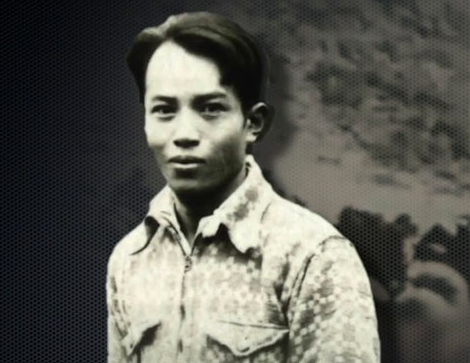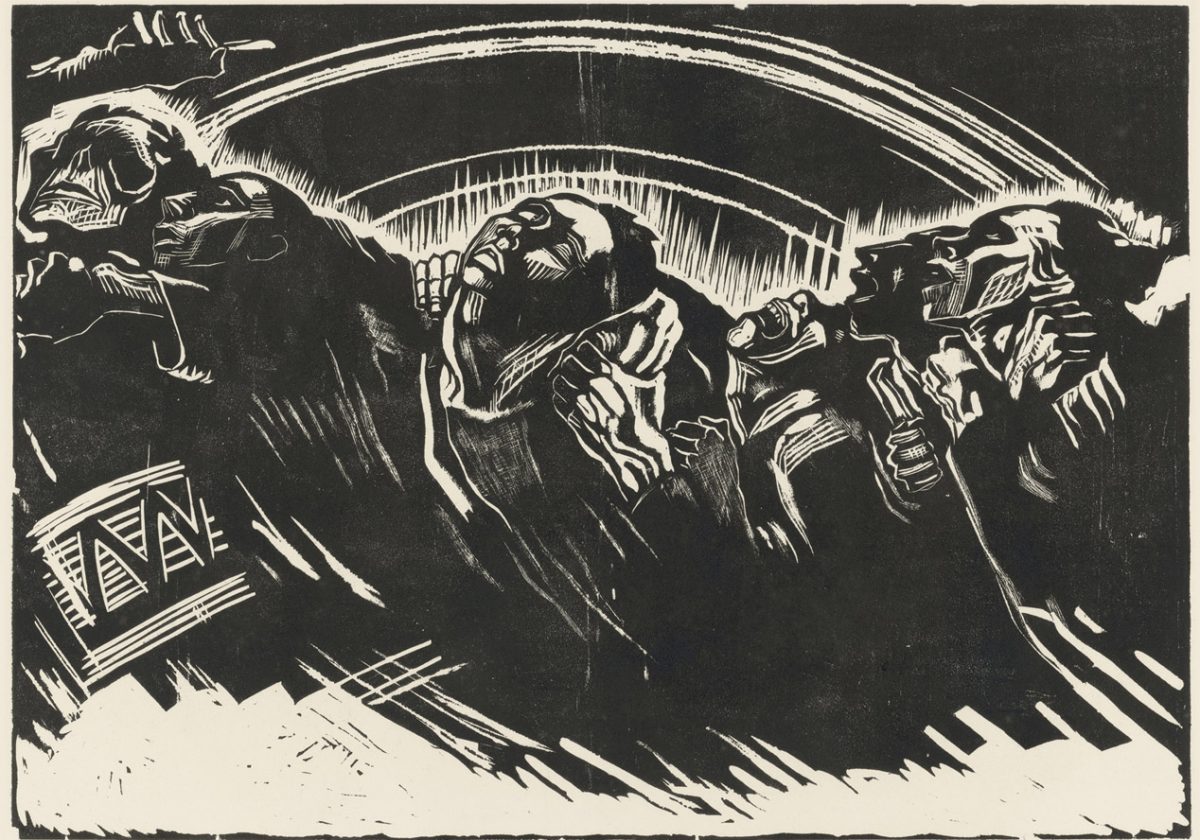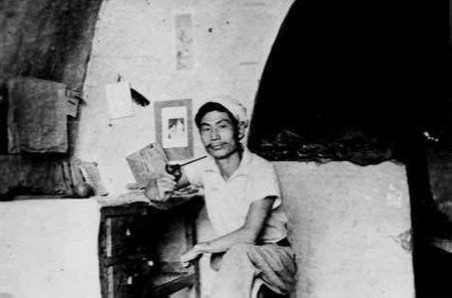by Zhang Yumao
Althrough both Xiao Jun and Wang Shiwei lived in Yanan, they didn’t know each other. Xiao Jun was employed by the All-China Writer’s Resistance Association while Wang Shiwei worked at the Central Research Institute, originally known as the Academy of Marxism-Leninism. So, how did Xiao Jun manage to get mixed up in the calamitous ‘Wang Shiwei Incident’? It’s a long story…
Since he arrived in Yanan from Shanghai in 1937, Wang Shiwei held the position of special researcher at the Central Research Institute’s Compilation and Translation Bureau. In the space of four years, working on the translation into Chinese of the classic works of Marxism-Leninism, he had managed to translate close to two million words, contributing a great deal to the spread of the ideology throughout China. Unfortunately, Wang had a self-conceited and combative personality, it seemed as if nothing gave him more pleasure than butting heads with his superiors. In Yanan’s ‘Liberation Daily’ newspaper he published a series of controversial essays, including ‘Politicians, Artists’ and the famous ‘Wild Lily’, he also produced a wall newspaper named ‘Arrow and Target’.
For a period of time, whenever the latest issue of ‘Arrow and Target’ was pasted to a wall in the busiest part of town, residents would flock to read it with the same excitement and enthusiasm as they would have when going to a temple fair. These essays, focussing on the social life in Yanan and the personal relations between the party ranks, contained one-sided, polemical and excessive attacks on individual party members. During the Yanan Rectification Movement, some members of the literary and art world faced rebuke for ‘incorrect tendencies’ found in their writings. After submitting self-criticisms and admitting their faults, they were forgiven by the party. But Wang Shiwei’s personality prevented him from conceding to the party authorities, consequently the situation continued to escalate, he was accused of being a Trotskyist, a Kuomintang spy, and then finally, he was arrested. After five years of imprisonment, he was executed in Xing county in Shanxi province. Decades later in 1991 he was ‘politically rehabilitated’, but of course, there was no way of reversing his execution…
As the attacks on Wang Shiwei become more severe, only one friend stuck by him, a writer who was also acquainted with Xiao Jun. He knew that Xiao was in contact with Mao, so he begged him to report the situation, in the hope that Mao would intervene.
Xiao Jun, characteristically overconfident about the influence he had on Mao, agreed without hesitation, but when he brought the topic up, he was met with Mao’s polite but flat rejection. Mao told him, “This isn’t something you should get involved in, it’s a complicated matter. This isn’t an average case of ideological deviation, Wang is suspected of being a Trotskyist and a Kuomintang spy.” Although Xiao Jun heeded Mao’s words and never again brought up the subject, word soon spread that Xiao Jun had complained to Mao about the treatment of Wang Shiwei, infuriating a number of party cadres.
Not long after, Xiao Jun accompanied his colleagues to Wang Shiwei’s workplace, the Central Research Institute, to take part in mass meeting against him. The meeting was a disaster, every time Wang tried to speak, he was shouted down by the furious audience before he got a single word out. Xiao Jun sitting in the back of the meeting hall, couldn’t hear what was being said at the front, irritated, he stood and yelled, “Let him speak! Give him a chance to explain himself.” Suddently everyone’s eyes were on Xiao Jun, but he didn’t give a damn. On the road back home, after the meeting, he vented his frustration in front of his colleagues, he thought that the way people treated Wang Shiwei was totally irrational, a violation of the ideal of ‘seeking truth through facts’. In his own idiosyncratic idiom he let fly a few coarse words, threatening to dunk people’s heads in chamber pots. A female colleague reported him to their workplace’s party organization, after which the situation took a turn for the worse.

A few days later, the Central Research Institute sent four representatives to Xiao Jun’s residence to lodge a protest against him. They accused him of sabotaging the meeting, and demanded that he admit his wrongdoing and apologize. Xiao Jun lost his temper, not only did he refuse to apologize, in a rage he kicked the representatives out of his house. Before he had time to calm down, he drafted and submitted a written report to the Central Research Institute and Chairman Mao explaining what he saw as the facts of the situation, and clarifying his own views. He titled the report, ‘Memorandum’.
On the afternoon of October 9th 1942, a conference was held in Yanan commemorating the sixth anniversity of Lu Xun’s death, attracting a crowd of over two thousand people. To everyone’s horror, Xiao Jun seized the opportunity to read aloud his ‘Memorandum’ in front of the enormous crowd. This reckless move only added fuel to the fire, immediately sparking a furious attack on Xiao Jun by other writers. Seven of them, both party and non-party members, took turns excoriating him. With no one to back him up, an impassioned Xiao Jun took on the others single-handedly, growing more infuriated as the argument went on. The gigantic audience were deadly silent, no one dared leave the hall, everyone wanted to see what would happen to Xiao Jun. The debate continued without rest from 8pm until 2am. The chairman of the conference, Wu Yuzhang, tried to act as peacemaker, “Comrade Xiao”, he announced, “is a great friend of the party, today he caused a great furore, which means there must be something wrong with our methods. We should focus on unity, and we mustn’t avoid self-examination.” Wu’s words eased some of the tensions, and Xiao, recalling Mao’s advice to “strenuously scrutinize your own weaknesses” responded to his detractors, “I’m willing to submit a self-criticism admitting that I’m 99% to blame. Is that okay with you? Are you capable of accepting the other one percent?”
One writer, disregarding Wu Yuzhang’s plea for people to take a concilliatory and understanding approach, began to arrogantly lambast Xiao Jun, “We’re not even one percent at fault, it’s one hundred percent you! Listen up, Xiao: the friends of the Communist Party are everywhere, getting rid of you is like an elephant getting rid of a flea.”
Just when it seemed that Xiao Jun’s anger had finally subsided, he exploded yet again, springing to his feet, he yelled furiously in response, pounding his fist on the table, “I’ve already taken responsibility for 99% and you can’t even own up to your own one percent? Sure, you have friends all over, but this ‘flea’ will never attach itself to your ‘elephant’, don’t even think about touching this ‘flea’, from now on we’re fucking finished!”. He then stormed out of the conference hall. After the meeting, Xiao Jun was all but charged with the crime of “sympathizing with Trotskyist Wang Shiwei”.
However for Xiao Jun, the fued was not renewed again until several years later in 1948. Xiao Jun was working at the time as the editor of Harbin’s ‘Cultural Gazette’ newspaper. Due to Communist Party dissatisfaction with the dissident views published in the paper, it was forced to close and Xiao was again the target of party criticism. As a result of both the views he published in the newspaper and his previous conduct during the Wang Shiwei incident he was sentenced to a period of reform through labour in a coal mine in Manchuria.
In later years Xiao Jun made light of his own hardship, saying, “Old scores and new scores were all settled in one go! Luckily it was a case of having so many debts, you stop worrying about them, when you’re covered in mosquitoes, a single bite no longer hurts.”

